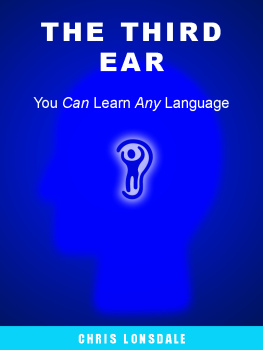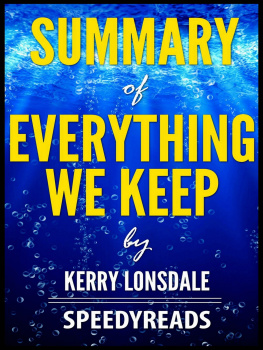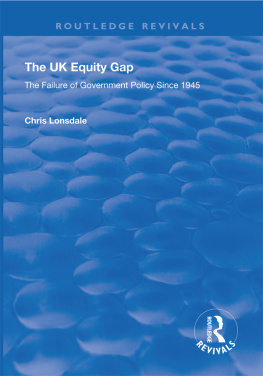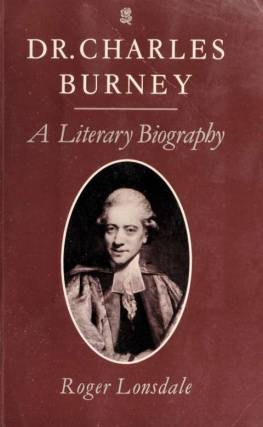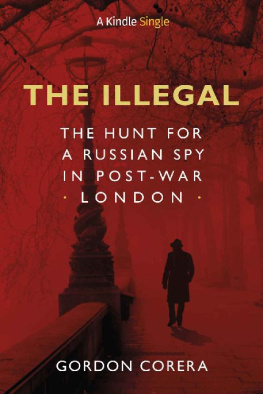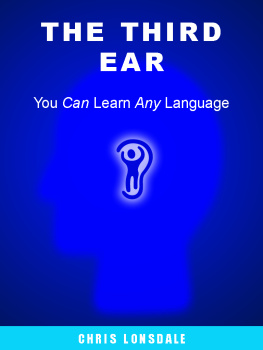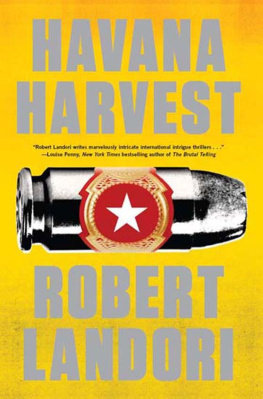Lonsdale - Third Ear: You Can Learn Any Language
Here you can read online Lonsdale - Third Ear: You Can Learn Any Language full text of the book (entire story) in english for free. Download pdf and epub, get meaning, cover and reviews about this ebook. publisher: Bookbaby, genre: Home and family. Description of the work, (preface) as well as reviews are available. Best literature library LitArk.com created for fans of good reading and offers a wide selection of genres:
Romance novel
Science fiction
Adventure
Detective
Science
History
Home and family
Prose
Art
Politics
Computer
Non-fiction
Religion
Business
Children
Humor
Choose a favorite category and find really read worthwhile books. Enjoy immersion in the world of imagination, feel the emotions of the characters or learn something new for yourself, make an fascinating discovery.
- Book:Third Ear: You Can Learn Any Language
- Author:
- Publisher:Bookbaby
- Genre:
- Rating:4 / 5
- Favourites:Add to favourites
- Your mark:
- 80
- 1
- 2
- 3
- 4
- 5
Third Ear: You Can Learn Any Language: summary, description and annotation
We offer to read an annotation, description, summary or preface (depends on what the author of the book "Third Ear: You Can Learn Any Language" wrote himself). If you haven't found the necessary information about the book — write in the comments, we will try to find it.
Third Ear: You Can Learn Any Language — read online for free the complete book (whole text) full work
Below is the text of the book, divided by pages. System saving the place of the last page read, allows you to conveniently read the book "Third Ear: You Can Learn Any Language" online for free, without having to search again every time where you left off. Put a bookmark, and you can go to the page where you finished reading at any time.
Font size:
Interval:
Bookmark:

CHRIS LONSDALE has lived and worked in Asia for a quarter-century. After studying psychology in New Zealand, where he spent the first 20 years of his life, he travelled to Beijing just after China opened to the West. An initial fascination with Chinese language and culture took him on an adventure that included travels all over China, intensive study in the Chinese martial arts, physical injury, and a subsequent reevaluation of lifes priorities.
From China Chris moved to Hong Kong, which has been his base for the past 20 years. He currently runs his own business as a senior leadership coach and organisational advisor. This work takes him to many parts of the world, and gives him a privileged position to observe and influence some of the more complex problems faced by people in organisations. In the last 25 years Chris has visited places as diverse as the southern forests of India, the North Pole, and some of the worlds most important industrial and financial centres.
Chris is a fluent speaker of English, Mandarin and Cantonese, and has dabbled in a number of other languages. He is married, with one daughter whom he says was, in many ways, the inspiration behind The Third Ear.
Chris Lonsdale

Third Ear Books
THE THIRD EAR
ISBN-13: 978-988-19845-24
2006 Chris Lonsdale
Third Ear Publishing Ltd.
6/F Tung Hip Commercial Building,
244248 Des Voeux Road, Hong Kong
http://www.the-third-ear.com
Cover design: Daniel Chui
Cartoons: Stephen Roberts
Graphics: Andrew Mok
Typeset in Minion by Alan Sargent
Second printing, 2007
All rights reserved. No part of this book may be reproduced in any form or by any electronic means, including information storage and retrieval systems, without permission in writing from the publisher, except by a reviewer who may quote brief passages in a review. The right of Chris Lonsdale to be identified as the Author of the Work has been asserted as have his moral rights with respect to the Work.
This book is dedicated to all those people who really do want to learn a foreign language, but who have been frustrated in the process. Some have continued to battle on, sometimes successfully, but often with slow results. Others have simply come to believe that its too difficult for them. This book has been written to show that, no matter who you are, you can master any language. Not just that. It can be easy and fun. Its just a matter of knowing how.
I would like to take this opportunity to acknowledge all the people who have contributed to making this book a reality.
Firstly, Id like to thank Kevin Jones, Allen Dorcas, Michelle Tanmizi, Diane Wilcoxson, Jonathan Harger, Roger Bell, Robert Atter, Jeremy Kidner, Colin Jesse and the many others who gave insights into the language learning process, both from their own experience, and from observing the experience of others.
Equally important is the contribution of the core group of testers, who worked with the ideas in the book. Many thanks go to Andrew Mok, Augustine Tan, Marc Mostacci, Steve Udy, Janet Blount, Christian Masset, Panida Tang-sriwong, Thirawit Leetavorn, Mark Michaud, Larry Gaffaney, Philip Jackson, Tina Boe-Hansen, Dirk Rossey, Michael Boddington, Elizabeth Bridgeman, Margaret Leung, Luan Xiuju, Naaz Kazi, James Rynne, Zoe Fitzgerald, Lyn Brewster, Andrea Gutwirth, Carol Wong, Angela Spaxman, Uli Burke and Sayed Gouda. Paul Coffey deserves special mention for putting into action all of the ideas in the book, resulting in him learning to speak Mandarin in just a few short months.
Many people helped in the books creation, reading various versions and giving useful input that helped to shape the final version, or simply just giving encouragement. Special thanks go to Mark Tier, Michael Guss, Tony Giles, William Courtauld, Huaying Zhang, Chris Robinson, Leon Jakimic, Graham Earnshaw, Simon Chau, Barry Brewster, David Brooks, Maureen Mueller, Gilles Bassi, Mark Powell, Mark Michaud, Cathy Lee, Edith Scott, Daniel Spitzer, Leanne Wang, Sylvain Gauthier, Richard Finn, Andy Boerger, Steve Alexander, Andrew Matthews, Jeremy Blodgett and Manab Chakraborty. Several hundred people contributed to the decision process for the title, weighing in on various options. Thank you all for making your thoughts known. The final inspiration that led to the title The Third Ear came from Tom Masterson and Sarah Monks. Thanks guys.
Help came in many other forms as well.
Stephen Roberts did a great job taking some of the key ideas of the book, and turning them into simple, fun cartoons.
Magnus Bartlett and Peter Gordon both provided helpful guidance for the whole publishing process.
Alan Sargent took what I thought was a well-honed piece of work and honed it even further. His disciplined editing has, I hope, made a definitive impact on the final work.
Importantly, Id like to thank my daughter Michelle for giving me the chance to watch her as she grappled with her first language. In many ways The Third Ear could not have been written without those insights from a first-time beginner. It was almost as if her arrival was necessary for key pieces to fall into place. Thanks Michelle.
And finally, my deepest thanks go to my wife, Fengdi, for standing quietly by me for the many years that it took from initial concept to finally completing the book.
Chris Lonsdale
October, 2005
Learning Chinese is really difficult, she said to me. I worked solid for two years, and even then only had the basics. And, theres no way a person can learn Chinese faster than that.
I was at a seminar in Hong Kong, and the young woman really meant it. She had learnt to speak Mandarin Chinese and, quite clearly, it had been a difficult process for her. But it didnt have to be that way. It certainly didnt match my own experience, or that of the many other people who have learned a new language easily and effectively.
I told her that I thought Chinese can be mastered very quickly by a Westerner in just a few months, actually. She replied that this was not possible, and looked at me like I was slightly mad.
Rather than get into an argument with her, I decided to write this book.
This book is about you, and the things that you can do to learn a new language faster and more easily than you ever thought possible. Its also about me, because it follows the journey that I have taken to learn what many consider, in the West, quite difficult languages Mandarin Chinese and Cantonese. The lessons about how to learn a language apply equally to languages that could be considered easier.
In the pages that follow I will share the personal strategies and techniques that have worked for me, and other successful language learners that I have talked to.
Im writing this book for one simple reason I want you to discover how to better use your natural language talent more effectively. After all, youre a language genius anyway you have to be if you mastered your mother tongue! Remember, you came into the world with no words and no grammar. You had nothing to hook on to and, somehow, you still became fluent.
If you are reading this book you probably want to learn a new language. Maybe you are about to go to a new country to live or work. Possibly you are already there. Maybe you have decided that, for work or some other reason, you need to master another language even if you are staying at home. Or maybe you are just interested in learning a new language. Whatever your reason, Im sure you want to know how to do it with the greatest ease and the most fun.
Font size:
Interval:
Bookmark:
Similar books «Third Ear: You Can Learn Any Language»
Look at similar books to Third Ear: You Can Learn Any Language. We have selected literature similar in name and meaning in the hope of providing readers with more options to find new, interesting, not yet read works.
Discussion, reviews of the book Third Ear: You Can Learn Any Language and just readers' own opinions. Leave your comments, write what you think about the work, its meaning or the main characters. Specify what exactly you liked and what you didn't like, and why you think so.

